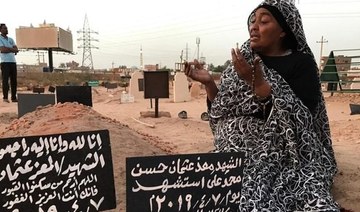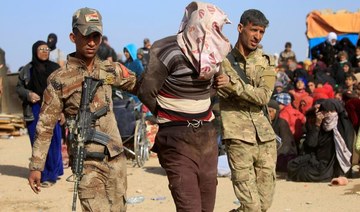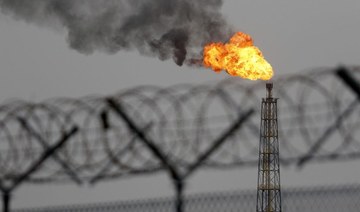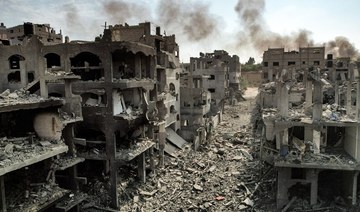KHARTOUM, Sudan: A transition agreement between Sudan’s ruling military council and a pro-democracy coalition was scheduled to be signed Saturday, a top African Union diplomat said, just hours after the military claimed it thwarted an attempted coup by a group of officers.
The AU’s Mohammed el-Hassan Labat made the announcement Friday. The transition agreement sets up a joint Sovereign Council that will rule for a little over three years while elections are organized.
Ethiopian mediator Mahmoud Dirir, who has been involved in mediating between the two sides, told reporters that the political declaration will be “debated on, discussed and signed at the same time.”
The deal is meant to break the political deadlock that has gripped the country following the overthrow of autocratic President Omar Al-Bashir in April.
Lt. Gen. Gamal Omar, a member of Sudan’s military council, said the coup attempt took place late Thursday, just days after the military and the pro-democracy coalition had agreed to the joint sovereign council.
In a statement, Omar said at least 16 active and retired military officers were arrested. Security forces were pursuing the group’s leader and additional officers who took part in plotting the coup attempt, he said, but the council did not reveal the name of the attempted leader, his rank or other details.
“The attempted coup came in a critical time, ahead of the deal with the Forces for the Declaration of Freedom and Change,” Omar said, referring to the coalition of political groups that speaks for the pro-democracy demonstrators.
Earlier this week, Gen. Abdel-Fattah Burhan told the pan-Arab Asharq Al-Awsat newspaper that the ruling military council has thwarted several military coup attempts and that investigations were underway to determine who were behind them.
Tarek Abdel Meguid, an FDFC leader, voiced skepticism about the military’s announcement of a failed coup, calling it a hoax meant to pressure pro-democracy forces into signing the deal.
“They want to say that the situation in Sudan is very volatile, and that there is a deep state with people capable of staging a military coup, so we should hurry up and sign and leave any points of difference to be discussed later,” Abdel Meguid told the Associated Press.
Last week, the military and FDFC representatives announced that they had reached a power-sharing agreement amid robust African and international pressure.
A military leader is to head the council for the first 21 months, followed by a civilian leader for the next 18. They also agreed on an independent Sudanese investigation into the deadly crackdown by security forces on the protests last month — though it’s unclear if anyone will be held accountable. The military also agreed to restore the Internet after a weekslong blackout.
The political transition deal is meant to end the impasse between the military council and the protest movement since security forces razed a massive pro-democracy sit-in in Khartoum early last month, killing more than 100 people, according to protest organizers. A committee of legal experts was assigned to draft the details before it would be handed over for both parties to sign.
The signing ceremony was expected to take place earlier this week, but several delays were announced, raising suspicions the two parties might still be divided over the agreement’s details. Several pro-democracy activists and party leaders had said the transitional military council was seeking to alter some of the language to increase the mandate of the generals during the transitional period.
Rasha Awad, editor of the online Sudanese newspaper Altaghyeer, said the military council’s actions will determine what happens next.
“I believe that the FDFC had already made a lot of concessions in this deal, but it seems that the military still expects more from them. If the military insists on that, the signing will be delayed further,” she said.
Awad also concurred that the announcement of a failed coup might be a ruse to use against the pro-democracy movement. But she did not rule out the possibility that the remnants of Bashir’s regime within the state might be plotting a comeback through a military coup.
“Counterrevolutionary forces represented in the old Islamist regime are very active now,” she said.
AU envoy: Sudan military, protesters to sign political deal
AU envoy: Sudan military, protesters to sign political deal
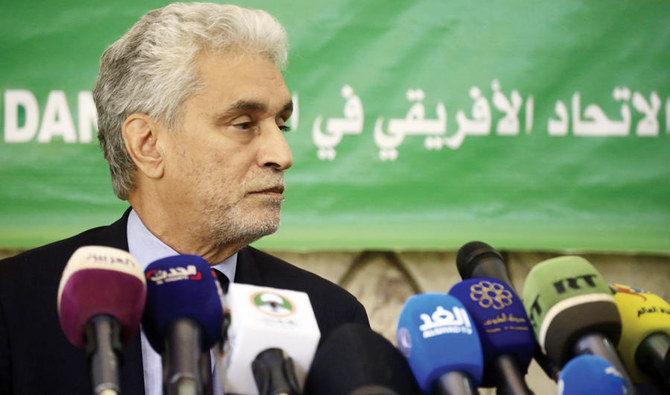
- A military leader is to head the council for the first 21 months, followed by a civilian leader for the next 18
- Ethiopian mediator Mahmoud Dirir has been involved in mediating between the two sides
Wars in Gaza and Sudan ‘drive hunger crisis affecting 280 million worldwide’
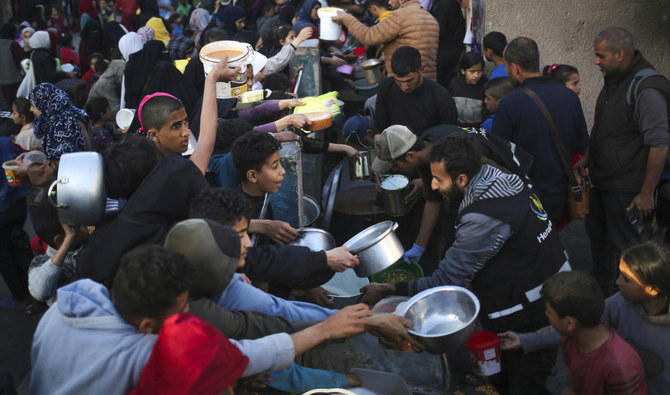
- New report on global food insecurity says outlook for 2024 is ‘bleak’
JEDDAH: More than 280 million people worldwide suffered from acute hunger last year in a food security crisis driven by conflicts in Gaza and Sudan, UN agencies and development groups said on Wednesday.
Economic shocks also added to the number of victims, which grew by 24 million compared with 2022, according to a report by the Food Security Information Network.
The report, which called the global outlook for this year “bleak,” is produced for an international alliance of UN agencies, the EU and governmental and non-governmental bodies.
Food insecurity is defined as when populations face food deprivation that threatens lives or livelihoods, regardless of the causes or length of time. More geographical areas experienced “new or intensified shocks” and there was a “marked deterioration in key food crisis contexts such as Sudan and the Gaza Strip,” said Fleur Wouterse, a senior official at the UN’s Food and Agricultue Organization.
Since the first report by the Global Food Crisis Network covering 2016, the number of food-insecure people has risen from 108 million to 282 million, Wouterse said. The share of the population affected within the areas concerned had doubled from 11 percent to 22 percent, she said.
Protracted major food crises are ongoing in Afghanistan, the Democratic Republic of Congo, Ethiopia, Nigeria, Syria and Yemen. “In a world of plenty, children are starving to death,” UN Secretary-General Antonio Guterres said.
“War, climate chaos and a cost-of-living crisis, combined with inadequate action, mean that almost 300 million people faced acute food crisis in 2023. Funding is not keeping pace with need.”
According to the report, situations of conflict or insecurity have become the main cause of acute hunger. For 2024, progress would depend on the end of hostilities, said Wouterse, who said aid could rapidly alleviate the crisis in Gaza or Sudan, for example, once humanitarian access to the areas was possible.
Yemen’s Houthis carry out three military operations in Gulf of Aden, Indian Ocean

- Houthis targeted the Maersk Yorktown ship and an American warship destroyer
CAIRO: Yemen’s Houthis said they targeted the Maersk Yorktown ship and an American warship destroyer in the Gulf of Aden as well as targeting the Israeli ship MSC Veracruz in the Indian Ocean, the Iran-aligned group’s military spokesman Yahya Sarea said in a televised speech on Wednesday.
Iraq hangs 11 convicted of ‘terrorism’: security, health sources
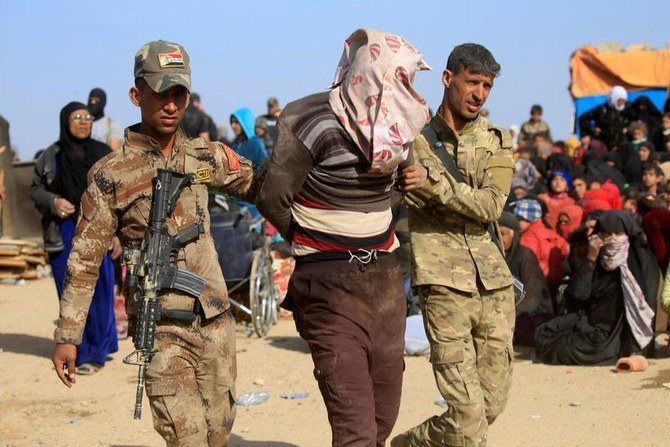
- Under Iraqi law, terrorism and murder offenses are punishable by death, and execution decrees must be signed by the president
- A security source in Iraq’s southern Dhi Qar province told AFP that 11 “terrorists from the Daesh group” were executed by hanging at a prison in Nasiriyah
NASIRIYAH, Iraq: Iraqi authorities have executed at least 11 people convicted of “terrorism” this week, security and health sources said Wednesday, with rights group Amnesty International condemning an “alarming lack of transparency.”
Under Iraqi law, terrorism and murder offenses are punishable by death, and execution decrees must be signed by the president.
A security source in Iraq’s southern Dhi Qar province told AFP that 11 “terrorists from the Daesh group” were executed by hanging at a prison in the city of Nasiriyah, “under the supervision of a justice ministry team.”
A local medical source confirmed that the health department had received the bodies of 11 executed people.
They were hanged on Monday “under Article 4 of the anti-terrorism law,” the source added, requesting anonymity due to the sensitivity of the issue.
All 11 were from Salahaddin province and the bodies of seven had been returned to their families, the medical official said.
Iraqi courts have handed down hundreds of death and life sentences in recent years for people convicted of membership in “a terrorist group,” an offense that carries capital punishment regardless of whether the defendant had been an active fighter.
Iraq has been criticized for trials denounced by rights groups as hasty, with confessions sometimes obtained under torture.
Amnesty in a statement on Wednesday condemned the latest hangings for “overly broad and vague terrorism charges.”
It said a total of 13 men were executed on Monday, including 11 who had been “convicted on the basis of their affiliation to the so-called Daesh armed group.”
The two others, arrested in 2008, “were convicted of terrorism-related offenses under the Penal Code after a grossly unfair trial,” Amnesty said citing their lawyer.
Biden says Israel must allow aid to Palestinians ‘without delay’
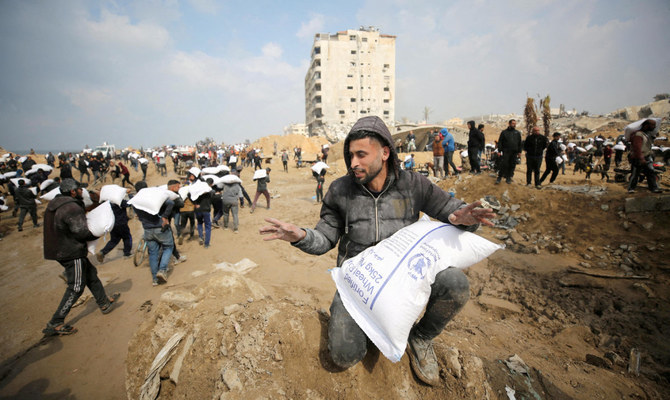
- “We’re going to immediately secure that aid and surge it,” Biden said
- “Israel must make sure all this aid reaches the Palestinians in Gaza without delay“
WASHINGTON: President Joe Biden on Wednesday demanded that new humanitarian aid be allowed to immediately reach Palestinians in the Gaza Strip as key US ally Israel fights Hamas there.
“We’re going to immediately secure that aid and surge it... including food, medical supplies, clean water,” Biden said after signing a massive military aid bill for Israel and Ukraine, which also included $1 billion in humanitarian aid for Gaza.
“Israel must make sure all this aid reaches the Palestinians in Gaza without delay,” he said.
US-Israel relations have been strained by Israel’s conduct of the war in Gaza and Israeli Prime Minister Benjamin Netanyahu’s plan to send troops into the southern Gazan city of Rafah, where 1.5 million people are sheltering, many in makeshift encampments.
“This bill significantly — significantly — increases humanitarian assistance we’re sending to the innocent people of Gaza who are suffering badly,” Biden said.
“They’re suffering the consequences of this war that Hamas started, and we’ve been working intently for months to get as much aid to Gaza as possible.”
Israel hits Lebanese border towns with 14 missiles
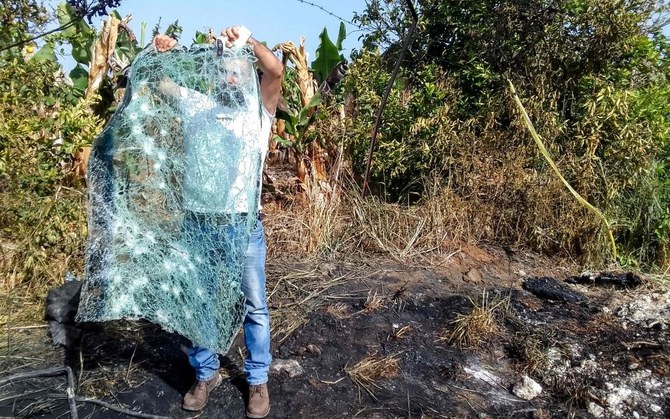
- Hezbollah targets Israeli settlements in retaliation for Hanin civilian deaths
- Hezbollah said it attacked the Shomera settlement with dozens of Katyusha rockets
BEIRUT: Clashes between Hezbollah and Israeli forces escalated sharply on Wednesday, the 200th day of conflict in southern Lebanon’s border area.
Israeli airstrikes created a ring of fire around Lebanese border towns, with at least 14 missiles hitting the area.
In the past two days, military activity in the border region has increased, with Hezbollah targeting areas in northern Acre for the first time in the conflict.
On Wednesday, Israeli strikes hit the outskirts of Aita Al-Shaab, Ramya, Jabal Balat, and Khallet Warda.
The Israeli military said it had destroyed a missile launching pad in Tair Harfa, and targeted Hezbollah infrastructure in Marqaba and Aita Al-Shaab.
Israeli artillery also struck areas of Kafar Shuba and Shehin “to eliminate a potential threat.”
Hezbollah also stepped up its operations, saying this was in retaliation for the “horrific massacre committed by the Israeli enemy in the town of Hanin, causing casualties and injuries among innocent civilians.”
A woman in her 50s and a 12-year-old girl, both members of the same family, were killed in the Israeli airstrike. Six other people were injured.
Hezbollah said it attacked the Shomera settlement with dozens of Katyusha rockets.
The group said it also targeted Israeli troops in Horsh Natawa, and struck the Al-Raheb site with artillery.
It also claimed to have killed and wounded Israeli soldiers in an attack on the Avivim settlement.
Israeli news outlets said that a rocket-propelled grenade hit a house in the settlement, setting the dwelling ablaze.
Hezbollah’s military media said that in the past 200 days of fighting with Israel, 1,998 operations had been carried out from Lebanon, Yemen and Iraq, including 1,637 staged by Hezbollah.





